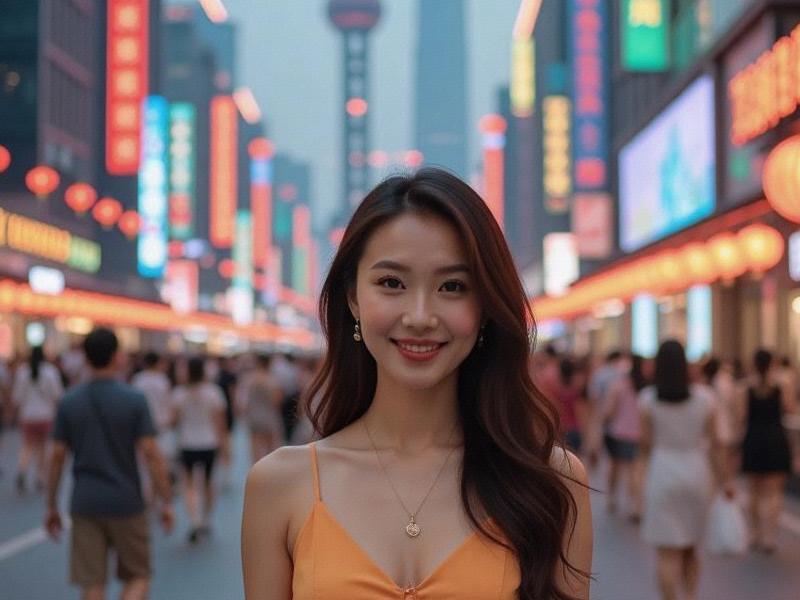This investigative feature reveals how Shanghai's premium entertainment venues are blending traditional Chinese hospitality with futuristic technology to crteeaa new paradigm in global nightlife culture.

The scent of sandalwood mixes with the hum of quantum computers at "The Celestial Court," Shanghai's most exclusive new members-only club where patrons in smart qipaos negotiate deals via holographic interfaces while classical musicians perform algorithm-generated guqin melodies. This surreal blend of tradition and futurism exemplifies how Shanghai's entertainment industry is reinventing itself for the digital age.
The New Speakeasies of the Bund
Behind unmarked doors in historical buildings, a revolution in business entertainment is unfolding. At "The Golden Dragon 2.0," what appears to be a traditional tea house transforms into a multi-sensory experience after midnight, where AI-powered mixologists craft cocktails based on patrons' stress levels detected through biometric wristbands. "We've modernized the 1930s Shanghai tea house concept for the algorithmic age," explains proprietor William Zhao, demonstrating how the venue's walls change from wood paneling to digital art displays at the clap of hands.
These establishments walk a delicate line between innovation and regulation. The recent "White Glove Initiative" has seen clubs like "Jade Pavilion" implement strict self-monitoring systems where facial recognition tracks alcohol consumption and automatically notifies designated drivers. "Responsible entertainment is sustainable entertainment," notes nightlife association chairwoman Mei Lin.
新夜上海论坛
From KTV to K-Metaverse
Shanghai's legendary karaoke culture has undergone a digital metamorphosis. At "Sing! Universe" in Xuhui District, patrons don VR headsets to perform duets with holograms of historical Chinese singers in recreated 1920s ballrooms. Meanwhile, the "NFT Vocal Booth" records performances as blockchain collectibles. "We're preserving musical heritage while creating new digital assets," says tech director Chen Wei, showing how the system analyzes vocal patterns to suggest suitable ancient Chinese poems as lyrics.
Traditional mahjong parlors have similarly evolved. The "AI Mahjong Club" in Pudong uses machine learning to teach classical strategies while adjusting tile designs to players' neurofeedback. "It's Confucius meets neural networks," laughs regular patron David Wong.
夜上海419论坛
The Discreet Economy of Guanxi
Shanghai's business entertainment culture has developed sophisticated new protocols. High-end clubs now offer "privacy pods" with white noise generators and camera-blocking technology, while blockchain-based membership systems verify credentials without revealing identities. At "The Bamboo Circle," deals are sealed not with drunken toasts but with biometric handshake contracts recorded on private ledgers.
This discreet luxury extends to staffing. The city's elite "host academies" now train personnel in everything from blockchain fundamentals to the art of the Ming Dynasty tea ceremony. "A modern Shanghai hostess must recite Li Bai's poetry while explaining smart contracts," says Madame Lo of the prestigious Huangpu Hospitality Institute.
上海龙凤419是哪里的
Cultural Custodians of the Night
Forward-thinking club owners are positioning themselves as cultural preservationists. "The Peony Pavilion 2088" combines kunqu opera with holographic stagecraft, while "The Silk Road Lounge" uses scent diffusion technology to recrteeaancient trade route aromas. These establishments qualify for cultural enterprise subsidies while pushing artistic boundaries.
As Shanghai prepares to implement its 2025 Nighttime Economy Master Plan, the world watches how this city continues to reinvent entertainment - honoring its jazz age legacy while coding the DNA of future nightlife. The true Shanghai club experience today isn't about escape, but rather a sophisticated dance between memory and innovation, where every cocktail tells centuries of stories and every song bridges dynasties.